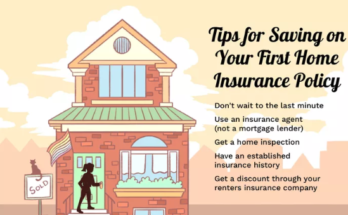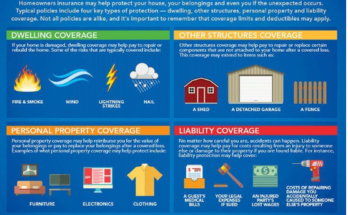10 Common Myths About Home Insurance Debunked
Home insurance is an essential aspect of protecting one of your most significant investments—your home. Despite its importance, many misconceptions persist about what home insurance entails. This review aims to debunk the ten most common myths about home insurance, shedding light on what homeowners should know to make informed decisions. Understanding these myths not only helps you secure the right coverage but also ensures that you are adequately protected against potential risks.
What are the 10 Common Myths About Home Insurance?
Home insurance myths can lead to misunderstandings and poor decision-making for homeowners. Here, we outline ten prevalent myths:
- Home Insurance is Optional
- Many people believe home insurance is not necessary. In reality, while it’s not mandatory in every state, most lenders require it when you take out a mortgage.
- Home Insurance Covers Everything
- A common belief is that home insurance will cover all types of damage. However, many policies exclude certain natural disasters, such as floods or earthquakes.
- Homeowners Associations (HOA) Insurance Covers Everything
- While HOA insurance covers common areas, it does not protect individual homeowners from damages to their property.
- You Only Need Home Insurance When You Buy a House
- Homeowners should maintain their insurance regardless of changes in ownership or property value.
- Renters Don’t Need Insurance
- Renters often think they don’t need insurance since they don’t own the property. However, renters insurance can protect personal belongings and provide liability coverage.
- All Home Insurance Policies are the Same
- Policies can vary widely in terms of coverage, limits, and premiums. It’s crucial to read the fine print and understand your policy.
- You Can’t File a Claim for Minor Damages
- Homeowners may hesitate to file claims for minor damages, thinking it will increase their premiums. However, it’s important to report all damages to understand your policy’s limits.
- Home Insurance is Too Expensive
- While costs can vary, there are ways to lower your premiums, such as bundling policies or increasing deductibles.
- Claims Will Always Raise Your Premiums
- It’s a myth that all claims lead to increased premiums. Some insurance companies offer accident forgiveness.
- Home Insurance Covers Home-Based Businesses
- Most standard home insurance policies do not cover business-related losses. Home-based business owners need separate coverage.
How 10 Common Myths About Home Insurance Work
Understanding the realities behind these myths can significantly influence your approach to home insurance. Here’s how each myth works in practice:
- Myth 1: Even if not required by law, having home insurance is a wise decision to protect your investment.
- Myth 2: It’s essential to read your policy and understand exclusions to avoid surprises during a claim.
- Myth 3: Always carry personal insurance to ensure your property is covered for damages not included in HOA insurance.
- Myth 4: Life changes, such as renovations or new acquisitions, should prompt you to reevaluate your insurance needs.
- Myth 5: Renters insurance is affordable and crucial for protecting personal belongings against theft or damage.
- Myth 6: Take the time to shop around for different policies to find one that best suits your needs.
- Myth 7: Filing a claim can sometimes be more beneficial than not reporting it, especially if you face larger damages later.
- Myth 8: Many discounts are available, so research different options to make your insurance more affordable.
- Myth 9: Each insurance provider has its own claim policy, so check how claims affect your specific premium.
- Myth 10: If you run a business from home, it’s crucial to get business insurance to protect your assets and income.
Features of 10 Common Myths About Home Insurance Debunked?
1. Comprehensive Coverage Options
Home insurance policies can cover a variety of perils, including fire, theft, vandalism, and certain natural disasters. However, understanding what is included and excluded is vital.
2. Liability Protection
Home insurance often includes liability coverage, protecting homeowners from lawsuits due to accidents or injuries that occur on their property.
3. Replacement Cost vs. Actual Cash Value
Some policies pay for the replacement cost of damaged items, while others only cover the actual cash value (the item’s current worth). Knowing which one your policy offers is crucial.
4. Additional Living Expenses
If a covered event makes your home uninhabitable, many policies cover additional living expenses, such as hotel bills and meals.
5. Discounts and Savings
Insurance companies often offer discounts for bundling policies, having security systems, or being claims-free.
6. Deductibles
Most home insurance policies have deductibles, which is the amount you must pay out of pocket before the insurance kicks in.
7. Home Inventory
Creating a home inventory can simplify the claims process, as it provides a clear record of your possessions.
8. Exclusions
Common exclusions include damages from floods, earthquakes, and routine wear and tear. Always check what your policy excludes.
9. Home-Based Business Coverage
For those running a business from home, standard policies may not cover business liabilities. Separate business insurance is advisable.
10. Reviewing Your Policy
It’s essential to review your home insurance policy regularly to ensure it meets your current needs, especially after significant life changes.
Pros of 10 Common Myths About Home Insurance Debunked?
| Pros | Explanation |
|---|---|
| Financial Protection | Protects against financial loss from damages or liability claims. |
| Peace of Mind | Knowing you’re covered can reduce stress. |
| Legal Requirement | May be required by lenders for mortgage approval. |
| Customizable Options | Policies can be tailored to meet individual needs. |
| Additional Coverage Options | Ability to add riders for additional protection. |
Cons of 10 Common Myths About Home Insurance Debunked?
| Cons | Explanation |
|---|---|
| Cost | Premiums can be expensive depending on coverage. |
| Complex Policies | Policies can be difficult to understand, leading to confusion. |
| Exclusions | Certain events are not covered, which can lead to financial surprises. |
| Claims Process | Filing a claim can be time-consuming and complex. |
| Premium Increases | Claims may lead to increased premiums in some cases. |
10 Common Myths About Home Insurance Debunked? Alternatives
| Alternatives | Explanation |
|---|---|
| Renters Insurance | For renters, protecting personal property without needing homeowners insurance. |
| Umbrella Insurance | Provides additional liability coverage beyond standard home insurance limits. |
| Business Insurance | Necessary for home-based business owners to cover business-related losses. |
| Flood Insurance | Separate policy specifically for flood damage, not covered by standard home insurance. |
| Earthquake Insurance | Optional coverage for earthquake damage, typically not included in standard policies. |
Conclusion and Verdict: 10 Common Myths About Home Insurance Debunked?
Understanding the myths surrounding home insurance is crucial for making informed decisions about your coverage. By debunking these misconceptions, homeowners can better navigate their options and ensure they have adequate protection for their homes and belongings. Remember to review your policy regularly, understand your coverage, and take advantage of available discounts to secure the best rates. Home insurance is not just an expense; it’s a safety net that can protect your most valuable asset.
FAQs: 10 Common Myths About Home Insurance Debunked?
- What is the purpose of home insurance?
- Home insurance protects homeowners from financial losses due to damages, theft, and liability claims.
- Do I need home insurance if I live in an apartment?
- Yes, renters insurance is essential to protect personal belongings and provide liability coverage.
- How can I reduce my home insurance premiums?
- Bundling policies, increasing deductibles, and installing security systems can help lower premiums.
- What should I do if I have a claim?
- Report the claim to your insurance company as soon as possible and provide documentation of the damage.
- How often should I review my home insurance policy?
- It’s advisable to review your policy annually or after significant life changes to ensure adequate coverage.
By understanding these key points, homeowners can navigate the complexities of home insurance with confidence and clarity.


